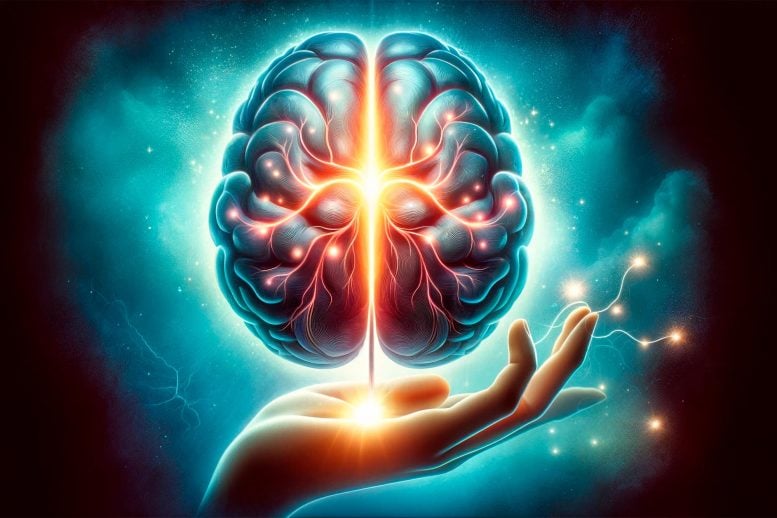Unveiling Brain's Hidden Highways through Epilepsy Surgery: Exploring the Significance of Neural Hubs

The University of Iowa's team has conducted research on epilepsy patients, revealing that brain hubs are vital for regular brain activity, especially in relation to language. The research shows a quick adaptive response within the brain following the removal of a language-related hub, challenging previous theories about the importance of these hubs. This research was credited to SciTechDaily.com.
An unusual experiment conducted during brain surgery has provided researchers with new insights into neural networks.
An international team of neuroscientists, led by the University of Iowa, have managed to record the human brain directly, both immediately before and after a crucial language-meaning brain hub was surgically disconnected. These results have highlighted the importance of brain hubs in neural networks and demonstrated the remarkable ability of the human brain to attempt compensating for the loss of a hub, at a quickness never before seen.
The research has posed questions about what occurs when the brain loses an important hub. Specifically, questions about the immediate impacts on the neural network and its method of compensation.
Hubs are universal concepts. For instance, the hub of a bike wheel, with its spokes radiating outwards, prevents the wheel from collapsing when ridden. Airport hubs connect various cities worldwide. Social hubs, such as coffee shops or online networks, are places where people gather for social interactions.
Brain hubs serve a similar purpose – they are points of intersection for numerous neuronal pathways, aiding in coordinating brain activities essential for complex functions. The indispensability of these highly interconnected brain hubs for certain brain functions has been a topic of debate. Some believe that the brain, due to its highly interconnected nature, can instantly compensate for the loss of a hub, analogous to traffic being redirected around a closed city center.
Credit for the research has been given to the University of Iowa Health Care.
Matthew Howard III, MD, a neurosurgery professor, and Christopher Petkov, PhD, a neurosurgery research vice chair, led a unique experimental opportunity with the UI neurosurgical and research teams. They achieved a breakthrough in understanding the necessity of a single hub.
Their research covered what happens when a required language-meaning hub is lost, revealing both the intrinsic importance of the hub and the brain's remarkable, rapid adaptability and partial compensation for the hub's loss. The findings were published recently in the journal Nature Communications.
The study was conducted on two patients undergoing epilepsy surgery. Both were undergoing procedures that required the surgical removal of the anterior temporal lobe, a crucial language-meaning brain hub. This was necessary to provide the neurosurgeons access to a deeper brain area causing the patients' debilitating epileptic seizures. These recordings help the team effectively treat the seizures while minimizing the impact of the surgery on the patients' speech and language abilities.
Typically, the recording electrodes are not required post-surgery and are thus removed. However, this study's novelty lay in the fact that the recorded electrodes were left in place, or replaced in the same location following the surgery. This innovative step allowed the researchers to obtain rare pre- and post-surgical recordings, thereby evaluating signals from areas far from the surgery site. Examining the change in responses to speech sounds before and after the loss of the hub revealed a swift disruption of signaling and consequent partial compensation of the broader brain network.
Christopher Petkov finds the quick impact on the speech and language processing regions, remote from the surgical treatment zone, surprising. He notes another surprise in how the brain attempts to compensate, albeit incompletely, within a short timeframe.
These findings negate theories that argue against the necessity of specific brain hubs, demonstrating their importance in maintaining typical brain processing for language.
Professor Howard, who is also part of the Iowa Neuroscience Institute, states that improvements in neurosurgical treatments and technology continue to broaden patient treatment options shared insight about the significance of safely obtaining and comparing electrical recordings pre and post-surgery, particularly in cases where a brain hub might be affected.
According to the researchers, the observation on the nature of the immediate impact on a neural network and its rapid attempt to compensate provides evidence in support of a brain theory proposed by Professor Karl Friston at University College London, which posits that any self-organizing system at equilibrium works towards orderliness by minimizing its free energy, a resistance of the universal tendency towards disorder. These neurobiological results following human brain hub disconnection were consistent with several predictions of this and related neurobiological theories, showing how the brain works to try to regain order after the loss of one of its hubs.
Reference: “Immediate neural impact and incomplete compensation after semantic hub disconnection” by Zsuzsanna Kocsis, Rick L. Jenison, Peter N. Taylor, Ryan M. Calmus, Bob McMurray, Ariane E. Rhone, McCall E. Sarrett, Carolina Deifelt Streese, Yukiko Kikuchi, Phillip E. Gander, Joel I. Berger, Christopher K. Kovach, Inyong Choi, Jeremy D. Greenlee, Hiroto Kawasaki, Thomas E. Cope, Timothy D. Griffiths, Matthew A. Howard III and Christopher I. Petkov, 7 October 2023, Nature Communications. DOI: 10.1038/s41467-023-42088-7
In addition to Petkov and Howard, the research team included researchers in the UI Departments of Neurosurgery, Radiology, and Psychological and Brain Sciences, as well as colleagues from Newcastle University, UCL, and University of Cambridge in the UK, and from Carnegie Mellon University, University of Wisconsin-Madison, and Gonzaga University in the United States.
The research was funded in part by grants from National Institutes of Health, the Wellcome Trust. and the European Research Council.




